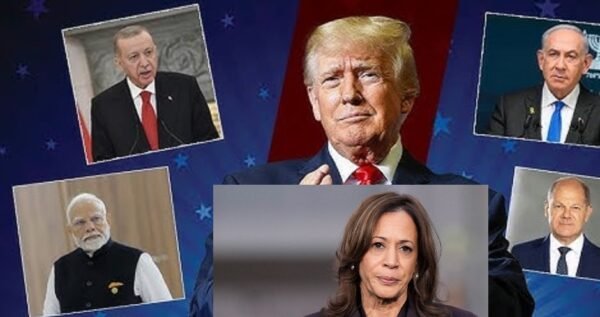What does Donald Trump’s Win Mean for the World? World reactions as Donald Trump wins US Presidential Election
Donald Trump’s victory in the 2024 U.S. presidential election has elicited a wide range of reactions from global leaders, reflecting both optimism and apprehension regarding the implications of his return to the White House. Here’s a comprehensive overview of international responses and what they may signify for global relations.
Global Reactions to Trump’s Win
Middle East Dynamics
- Israel: Prime Minister Benjamin Netanyahu hailed Trump’s victory as “history’s greatest comeback,” emphasizing the potential for renewed U.S.-Israel relations. He expressed hope for a robust partnership, particularly in light of ongoing conflicts in the region. Israeli Defense Minister Israel Katz echoed this sentiment, indicating eagerness to strengthen ties and tackle threats such as Iran.
- Iran: In contrast, Iranian officials downplayed the significance of Trump’s win, asserting that it would not alter Iran’s policies or impact its citizens’ livelihoods. The Iranian government reiterated its stability regardless of U.S. political changes.
- Palestinian Authority: President Mahmoud Abbas expressed cautious optimism about U.S. support for Palestinian aspirations under Trump, while Hamas indicated that their stance would depend on Trump’s policies regarding Palestinian rights.
European Perspectives
- United Kingdom: Prime Minister Keir Starmer congratulated Trump, emphasizing the strong historical ties between the U.S. and the UK. He expressed eagerness to work collaboratively in the coming years.
- European Union: Ursula von der Leyen, President of the European Commission, highlighted the importance of a strong transatlantic partnership, expressing hope for continued cooperation on shared agendas.
- Germany and France: Leaders from both countries responded cautiously. German Chancellor Olaf Scholz and French President Emmanuel Macron indicated readiness to work with Trump but remained vigilant about potential shifts in U.S. foreign policy.
Responses from Asia
- China: The Chinese government maintained a reserved stance, reiterating its commitment to mutual respect and cooperation with the U.S., reflecting a desire to stabilize bilateral relations despite past tensions.
- Japan and South Korea: Leaders from both nations expressed optimism about continuing strong alliances with the U.S., although concerns linger regarding U.S. commitments in light of Trump’s previous criticisms of these alliances.
Reactions from Latin America
- Argentina and Brazil: Argentine President Javier Milei celebrated Trump’s win as an opportunity for collaboration, while Brazilian President Lula da Silva took a more cautious approach, recognizing potential economic benefits but emphasizing the need for dialogue.
Implications for Global RelationsTrump’s return to power is expected to reshape various aspects of international relations:
- Military Strategies: His administration may adopt a more unilateral approach to military alliances, particularly concerning NATO and U.S. commitments in Eastern Europe amidst ongoing tensions with Russia.
- Economic Policies: Trump’s “America First” doctrine could lead to renegotiations of trade agreements and tariffs, impacting global markets and trade dynamics significantly.
- Middle Eastern Policy: With strong support from Israeli leaders, Trump’s presidency may see increased U.S. backing for Israel’s military actions and a more aggressive stance towards Iran.
Donald Trump’s victory signifies a potential shift in global dynamics marked by renewed alliances with certain nations while raising concerns among others about U.S. foreign policy unpredictability. As world leaders respond with a mix of enthusiasm and caution, the international community braces for how these changes will unfold in the coming years.
Global reactions to Donald Trump’s victory in the 2024 U.S. presidential election reflect a mix of optimism, concern, and strategic recalibrations across various regions. As world leaders respond, the implications of Trump’s return to the White House are expected to reverberate through international economic and political landscapes.
Middle East Dynamics
- Israel: Israeli Prime Minister Benjamin Netanyahu celebrated Trump’s win as a “historic comeback,” anticipating strengthened U.S.-Israel relations. He highlighted Trump’s previous efforts to foster Israeli-Arab ties, suggesting a more favorable environment for military and diplomatic maneuvers in the region.
- Ukraine: President Volodymyr Zelenskyy expressed hopes for enhanced cooperation with the U.S., particularly concerning military aid, reflecting dissatisfaction with the Biden administration’s cautious approach.
NATO and European Responses
- NATO: Secretary General Mark Rutte welcomed Trump’s leadership, emphasizing its importance for alliance strength. However, concerns linger about potential shifts in U.S. commitment to NATO under Trump.
- France and Germany: Leaders like Emmanuel Macron and Olaf Scholz discussed the need for a united European front, balancing cooperation with the U.S. while safeguarding European interests, especially in light of past trade tensions during Trump’s first term.
Reactions from Asia
- South Korea and Japan: Both countries reaffirmed their alliances with the U.S., although concerns about U.S. commitment persist. This may lead them to reconsider their defense strategies, including nuclear options.
- China: Analysts predict significant economic repercussions from Trump’s proposed tariffs on Chinese goods, which could exacerbate trade tensions and impact global supply chains.
Economic Implications
Trump’s return is anticipated to bring about significant changes in global trade dynamics:
- Protectionist Policies: Trump has pledged to impose steep tariffs on imports, particularly from China (up to 60%), which is expected to ignite new trade wars and increase inflation globally.
- Market Reactions: Initial reactions in global markets have been mixed, with some Asian stock indexes rising while others fell. The U.S. dollar strengthened significantly against major currencies following the election results.
- Long-term Economic Impact: Experts warn that Trump’s policies could lead to a reduction in global growth by up to 0.75% by 2030 due to escalating trade conflicts and inflationary pressures stemming from his administration’s decisions.
Latin America and Africa
- Latin America: Conservative leaders in South America, such as Argentina’s Javier Milei, welcomed Trump’s victory, viewing it as an opportunity for closer ties. However, Brazil’s current leadership expressed caution about potential economic impacts from Trump’s policies.
- Africa: Responses varied; while some leaders anticipated stronger economic partnerships with the U.S., analysts cautioned that Trump’s “America First” approach could negatively affect trade and aid relationships with African nations.
Donald Trump’s victory signifies a potential shift back to more unilateral U.S. foreign policies characterized by protectionism and a focus on national interests. While some nations express hope for enhanced bilateral relations, many are bracing for challenges that could arise from renewed trade wars and shifting geopolitical alliances. The global community will need to navigate these changes carefully as they unfold in the coming months.

